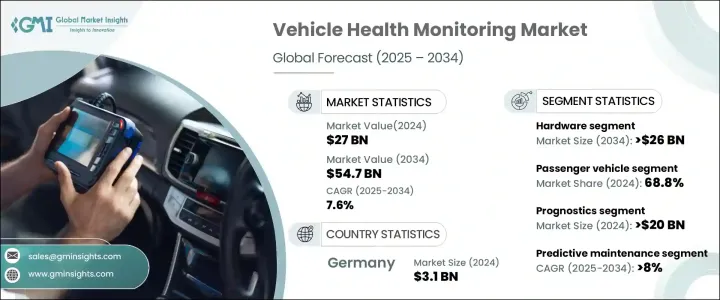
세계의 차량 상태 모니터링 시장은 2024년 270억 달러로 평가되었으며, 2025년부터 2034년까지 연평균 복합 성장률(CAGR) 7.6%로 확대될 것으로 예측됩니다.
실시간 진단 도구의 채용 증가, IoT 센서, 텔레매틱스, AI 주도형 애널리틱스의 진보가 시장 성장을 가속하고 있습니다. 차량 상태 모니터링 시스템은 엔진, 변속기, 브레이크 및 배터리와 같은 주요 구성 요소를 지속적으로 평가하여 최적의 성능을 보장하고 고장을 방지합니다.

클라우드 컴퓨팅과 에지 프로세싱은 운전자, 함대 운영자, 서비스 제공업체에 실시간 데이터 피드백을 제공하여 차량의 신뢰성을 높이고 고장을 최소화합니다. 자동차 제조업체와 하이테크 기업은 AI를 활용한 예측 분석, 원격 진단, OTA(무선) 업데이트를 통합하여 차량의 유지 보수를 최적화하고 있습니다. 실시간 On-Board Diagnostics(OBD)와 배기가스 감시를 의무화하는 정부 정책은 차량 상태 모니터링 솔루션 수요를 더욱 부추깁니다.
| 시장 범위 | |
|---|---|
| 시작 연도 | 2024년 |
| 예측 연도 | 2025-2034년 |
| 시작 금액 | 270억 달러 |
| 예측 금액 | 547억 달러 |
| CAGR | 7.6% |
실시간 진단은 예지 보전, 플리트다운 타임 최소화, 루트 관리 개선에 중요한 역할을 합니다. 회사는 또한 차량의 건강 데이터를 이용형 보험(UBI)에 활용하여 운전 행동과 차량의 상태에 따라 보험료를 조정하고 있습니다.
차량 상태 모니터링 시장은 하드웨어, 소프트웨어 솔루션, 서비스로 구분됩니다. 타이어 공기압, 연료 소비량, 배출 가스를 감시하고, GPS는 차량 추적을 강화하고 OBD 포트는 원격 진단을 가능하게 합니다. 자동차의 자동화와 커넥티비티의 향상이, 고도의 하드웨어 솔루션 수요를 촉진하고 있습니다.
이 시장은 승용차와 상용차를 포함한 차량 유형별로 분류되어 있습니다.
상태 관리를 기반으로 시장은 진단과 예후 관리로 나뉘어져 있습니다. 최신 차량에는 클라우드 기반 애널리틱스, IoT 대응 센서, 중요 시스템을 모니터링하는 디지털 트윈 기술이 탑재되어 있어 5G와 엣지 컴퓨팅의 통합으로 진단의 정확성과 효율성이 더욱 향상되고 있습니다.
시장은 용도별로 예지보전, 로드사이드 어시스턴스, 실시간 차량 진단, 배출가스 모니터링, 차량관리, 차량안전 및 보안으로 구분됩니다. 실시간 데이터와 유지보수 이력을 분석함으로써 예지보전 솔루션은 다운타임과 수리비용을 절감합니다.
독일은 2024년 유럽 차량 상태 모니터링 시장을 선도하여 약 31억 달러의 수익을 창출했습니다. 강력한 연구 개발 투자와 지능형 차량 기술의 급속한 채용으로 독일은 커넥티드 자동차 진단의 미래를 형성하는 중요한 국가입니다.
The Global Vehicle Health Monitoring Market was valued at USD 27 billion in 2024 and is projected to expand at a CAGR of 7.6% from 2025 to 2034. Increasing adoption of real-time diagnostic tools, advancements in IoT sensors, telematics, and AI-driven analytics are driving market growth. These technologies enhance vehicle monitoring, improve predictive maintenance, and reduce unexpected failures. Vehicle health monitoring systems continuously assess key components such as the engine, transmission, brakes, and battery, ensuring optimal performance and preventing malfunctions.

Cloud computing and edge processing enable real-time data feedback for drivers, fleet operators, and service providers, enhancing vehicle reliability and minimizing breakdowns. The increasing deployment of connected and autonomous vehicles further boosts demand for advanced diagnostics. Automakers and tech firms are integrating AI-powered predictive analytics, remote diagnostics, and OTA (over-the-air) updates to optimize vehicle maintenance. Monitoring battery charge levels in real time enhances energy efficiency and extends battery life. Government policies mandating real-time On-Board Diagnostics (OBD) and emissions monitoring further fuel demand for vehicle health monitoring solutions.
| Market Scope | |
|---|---|
| Start Year | 2024 |
| Forecast Year | 2025-2034 |
| Start Value | $27 Billion |
| Forecast Value | $54.7 Billion |
| CAGR | 7.6% |
Real-time diagnostics play a crucial role in predictive maintenance, minimizing fleet downtime and improving route management. The integration of these technologies into commercial fleet operations is transforming the telematics industry. Insurance companies are also leveraging vehicle health data for usage-based insurance (UBI), adjusting premiums based on driving behavior and vehicle condition. The evolution of AI and 5G networks is expected to enhance vehicle safety, efficiency, and operational cost savings.
The vehicle health monitoring market is segmented into hardware, software solutions, and services. The hardware segment captured over 50% of the market share and is projected to exceed USD 26 billion by 2034. This segment includes sensors, GPS, and OBD ports, which capture vehicle data to optimize performance. Sensors monitor engine temperature, tire pressure, fuel consumption, and emissions, while GPS enhances fleet tracking and OBD ports enable remote diagnostics. The increasing automation and connectivity of vehicles are driving demand for advanced hardware solutions. Government regulations mandating emission monitoring through OBD further encourage automakers to equip vehicles with high-precision sensors and diagnostic systems.
The market is also categorized by vehicle type, including passenger and commercial vehicles. Passenger vehicles held a 68.8% market share in 2024, while commercial vehicles are seeing significant growth due to rising demand for tailored maintenance services.
Based on health management, the market is divided into diagnostics and prognostics. The prognostics segment led with over USD 20 billion in 2024. Automakers and fleet operators are increasingly adopting prognostic solutions, which use real-time data analytics to predict malfunctions in advance. Modern vehicles are equipped with cloud-based analytics, IoT-enabled sensors, and digital twin technology for monitoring critical systems. The integration of 5G with edge computing is further refining diagnostic accuracy and efficiency. Unlike traditional maintenance inspections, prognostic systems analyze real-time sensor data and AI models to detect early signs of component degradation, enabling timely maintenance actions.
The market is segmented by application into predictive maintenance, roadside assistance, real-time vehicle diagnostics, emission monitoring, fleet management, and vehicle safety and security. Predictive maintenance is expected to register the highest CAGR of over 8% during the forecast period. AI, IoT, and real-time data computing are advancing predictive maintenance solutions, allowing sensors to continuously track essential vehicle components. By analyzing real-time data and maintenance history, predictive maintenance solutions reduce downtime and repair costs. The adoption of edge computing and cloud-based analytics further enhances the efficiency of these systems. Automakers and fleet operators are increasingly using predictive maintenance to improve vehicle performance and durability while minimizing operational expenses.
Germany led the European vehicle health monitoring market in 2024, generating around USD 3.1 billion in revenue. The country is at the forefront of IoT-enabled prognostics, AI-based diagnostics, and smart vehicle health monitoring systems. With strong R&D investments and rapid adoption of intelligent vehicle technologies, Germany remains a key player in shaping the future of connected car diagnostics.